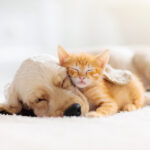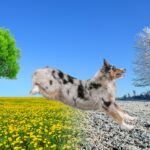It’s a common myth that milk is healthy for cats. Despite popular belief, cats are actually lactose intolerant and should not consume any dairy products, including milk.
Cartoons, children’s movies, and kitten calendars frequently display happy little kitties lapping up milk. While it’s an adorable scene, what they don’t tell you is that milk can cause weight gain, upset stomach, and diarrhea in cats.
In fact, cats simply need a balanced diet of the proper cat food and water. Your cat’s food should be determined by its age, weight, breed, and lifestyle.
Ideally, cats should only be given water to drink. Staying hydrated is a common issue for adult cats, and it can be dangerous and promote health issues such as kidney disease. If you have questions about ways to encourage increased water intake, give our office a call.
Why are dairy products bad for cats?
You may be wondering how cats are lactose intolerant if they consume their mother’s milk as kittens.
As cats get older, kittens lose the enzyme that breaks down lactose from their mother’s milk, and therefore, they lose the ability to process milk or dairy products. Generally, this happens after kittens are weaned from their mothers – around 8-10 weeks.
For many cat owners, the weaning process begins around four weeks, as owners introduce solid food and water alongside mother’s milk.
Contrary to popular belief, cow’s milk is not equivalent to a mother cat’s milk and does not contain all the nutrients needed to sustain a healthy, thriving cat.
In fact, cow’s milk has an unhealthy amount of fat which isn’t necessary for a cat’s diet. There are specially designed cat milk options available, which are more suitable and contain reduced lactose. However, these should only be given in moderation and under the supervision of your veterinarian.
As the kittens transition from milk to solid food and water, they lose the ability to process lactose altogether. Because of this, adult cats and weaned kittens may experience gastrointestinal distress when they consume milk or dairy products.
Why are cats attracted to milk?
You may find your cat still craves milk even though it results in an upset stomach. Cats are attracted to milk because of the high-fat content.
Much like humans, cats associate certain flavors, scents, and positive memories with comfort.
If your cat consumes any dairy products, keep an eye out for vomiting and symptoms of an upset stomach.
What should cats drink?
All cats need water as a part of their balanced diet. How much water they drink largely depends on their breed, lifestyle, age, size, and whether they eat wet or dry food.
As stubborn as they are, cats are more prone to dehydration than dogs. If your cat has underlying health issues, such as kidney disease, staying hydrated is particularly important.
Again, milk should not be included as a part of their daily diet. This includes pouring milk over dry food. Any kind of dairy products can have a negative effect on your cat’s digestive system and overall health.
If you have questions about how to encourage your cat to drink more water or the right diet choices for the breed, give our office a call.






